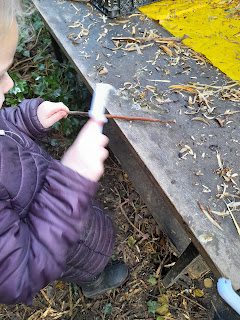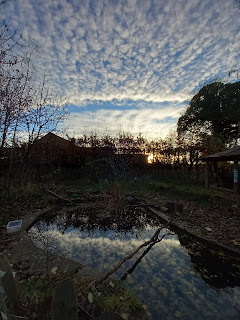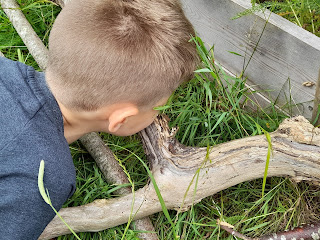Time...
Most of the effectiveness of Forest School comes from the quality of time spent outside. Children repeatedly doing both new things and returning to things they consider important expands their interests and their expertise. We know that repeated actions grow both muscle memory and strong neural pathways, but immersing yourself in something you love to do builds confidence and self-esteem. Discovering something new adds curiosity and motivation into the mix!
The children who were interested came and went at will, but a small core of 3 stayed for almost the entire session. They concentrated and followed instructions well enough for me to wander off and see what everyone else was doing, yet leave them getting on with the job while I was away. This task was how they chose to spend their time. They worked together, took pride in being trusted to do it independently, and were able to problem solve without my input. Frequently they DID ask for my opinion or help, they explained what they were doing to children who asked, and were able to instruct them on how to join in.
Knowing that Forest School will be there next week means the fear of missing out is less, freeing children up to decide what they want to focus on now, and what they will be happy to try another time. I have a lot of suggestions aimed at me that start with "next time, can we...?".
Many children will work on a project such as peeling or whittling and ask to leave it in the shed until they come back. Others try over and over to master a skill, with varying degrees of success, with no goal or judgement except their own. They are demonstrating patience, motivation, and an understanding that some processes take time...
This week was an average week. The children were independently exploring (my preferred word for child-led activities at Forest School, explained here), and I was pottering around, observing them, but getting on with some planting and fence mending. Of course, there were plenty of children who wanted to help me, so over the week, I had several little teams doing 'chores' independently.
It started with a group of Year 4s who wanted to help re-rope the maze. We have metres and metres of pathway weaving around our copse. They are lined with hundreds of tiny trees that the children have planted over the last two years. We've used twine to link these trees but it is now very worse for wear, so we have been using blue rope to denote the pathways more clearly.
The children who were interested came and went at will, but a small core of 3 stayed for almost the entire session. They concentrated and followed instructions well enough for me to wander off and see what everyone else was doing, yet leave them getting on with the job while I was away. This task was how they chose to spend their time. They worked together, took pride in being trusted to do it independently, and were able to problem solve without my input. Frequently they DID ask for my opinion or help, they explained what they were doing to children who asked, and were able to instruct them on how to join in.
Their involvement started last week, and this week they arrived desperate for a task. They said they liked to help, they enjoyed seeing what they'd achieved, and they were 'happy' that I trusted them to get on with it.
They used their time to roll out over 200 metres of blue rope and make sure all the bamboo canes were securely in the ground using the mallet.
The group was always in sight. I frequently reminded them they were free to go and explore if they wanted to, and as I said, many came and went, but a dedicated few stayed throughout: "we're going to finish what we started".
At the end of this week's session they had completed the job, were very happy with themselves, and were asking me to put aside a task to do next week!
Meanwhile, I have also been filling in gaps in a hedge, and extending it, on the grass alongside the school car park. I told groups I would be planting trees and lots of children came to have a go, planted one, and then went off to explore elsewhere. On Wednesday morning, a few Year 1 children were determined to fill all the gaps along one side. They looked for spaces big enough to plant a baby tree, I made a hole, and they put the tree in, added a cane, and slid the "anti bunny tube" over the top.
Two of these children devised a system. I dug the hole, they took it in turns to plant, stake, and protect the tree. They did every other one in turn and when others came to join in were in charge of instructing them on how to do it! This took up about 40 minutes of their session time, which is a pretty good attention span for a couple of 5/6yr olds!
That afternoon a few Year 2 children took over the task and we completed the second hedge along the other side of the car park. I was able to dig a row of holes and leave them to it! It freed me up to discuss with them, and others who dipped in and out of the activity, why we were planting, what we were planting, and what the plan was. I was able to be present, to observe, interact, and communicate, while they spotted the still attached nuts the hazel trees had grown from, looked closely at the root ball, and compare the size of nearby saplings. The children told me that the trees will help with pollution from the cars in the car park, that eventually there would be shade for the cars, and that our birds at Forest School would be 'excited'.
Yesterday a Year 5 pupil asked me what we planned to do with the pallets piled up at the front of Forest School. We were donated a dozen or so and have used them in various projects. I asked her what her suggestion was, and she said to build a platform with a slide...
Year 5 and I do love to raid the school skip (10 metres away from basecamp!) and she asked if we could go and look. The first thing she dragged out was a broken chair, half the metal legs had snapped but the plastic 'seat' part was intact, "Well we can take that apart easily" she muttered. She then saw a long metal door from a cupboard "That's the slide!" she grinned.
I helped her take both items back to the pallets. A couple of other children had come to see what we were doing. I gave one of them a screwdriver and asked them to remove the seat off the chair. A small working party decided to scout for a good place to put the slide, which they did, then in teams, we moved the pallets to a flat space under Mama Beech.
As this was not planned I had no tools bar blue rope, I said I was happy to help them tie the pallets together to minimise movement, so they stacked them and I tied the door on (and then tied the pallets together). This was not meant to be a revolutionary design, but it served their purpose for that session, and monitored, it can remain next week for other classes to experience.
We will work out together some safety rules, risk assess what will keep everyone safe, and decide whether to keep it, improve it, use tools to make it more permanent, paint it with wood preserver, etc...
It may well be that children choose to rearrange and create something different.
I was too busy working with and for the children to take lots of photos of their efforts, I had to make do with 'after' pictures to show what they achieved.
Keeping my role as supervisor, sounding board, listener, and prompter, all the children involved used critical thinking, discussion (with adults and peers), and prior knowledge to complete individual and team activities.
The youngest were 5, the eldest 10.
No one was obliged to participate.
If they joined in they didn't have to stay.
Many who only joined in for part of the time voiced disappointment that they hadn't done more, but that is also a great learning curve!
Self-chosen tasks lead to confidence, communication, and self-esteem as well as job satisfaction! Sometimes it's a big job, sometimes it's a small task.
Building resilience and self-motivation is not easy to do within the structures of curriculum, timetables, learning intentions, and mandatory involvement!
Hopefully, Forest School gives the time such developments need to strengthen, before taking back inside the classroom to support learning.
Oh, and before I forget, we're hosting FSL Level 3 training in May/June 2022
Link HERE for info!














Comments
Post a Comment